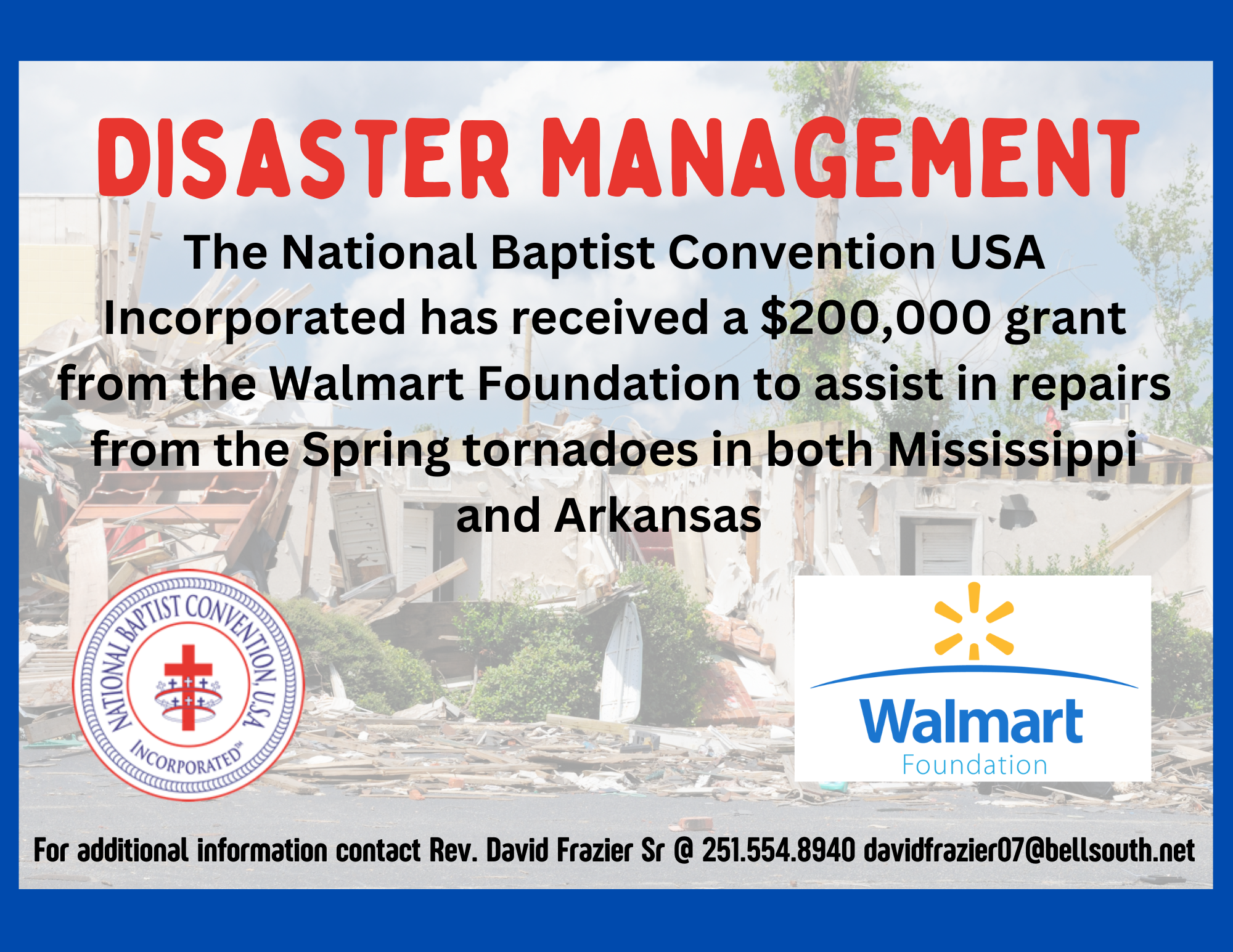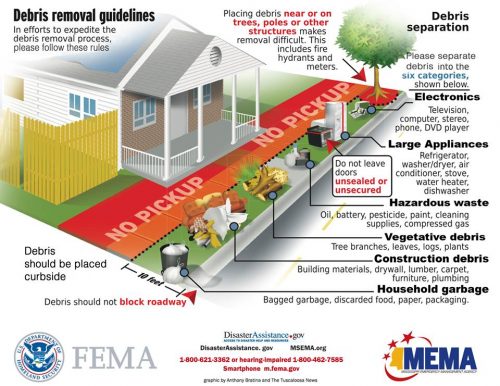Disaster Management Office of Disaster Management
The National Baptist Convention, USA, Inc. organizes fund raising and other supportive activities to assist our brothers and sisters across the United States and all over the world in the face of natural and man-made disasters.
This page of the website is devoted to providing our visitors with information concerning our current efforts towards assisting victims of catastrophes. Use the links to the left or below to find out what we’re currently doing and how you can help.
 Make a Donation
Make a Donation
Click Here to Make a Donation
Contact the Disaster Management Office
David L. Frazier, Sr., AL
Chairman Disaster Management
Warren D. Miller, MS
Co-Chairman Disaster Management
Email: [email protected]

HURRICANE PREPAREDNESS
GET KIT, MAKE A PLAN and BE INFORMED
Download the Emergency Supply List (FEMA)
Community Disaster Preparedness task force reminds the local public that it is as important to have an emergency plan in place for your family and pets before a hurricane is imminent.
“NOAA has predicted an above average season for hurricanes, which always raises red flags for local, state and federal governments who have been working toward better preparedness for hurricane season. Personal and family preparedness needs to be on everyone’s mind. We encourage that you have a planning conversation with your family now about what your family will do and where you will go if you are forced to evacuate.”
Here are some items you and your family should have in an emergency supply kit before tropical weather threatens:
- Flashlight and battery-powered radio with extra batteries.
- Canned and non-perishable food.
- Bottled water.
- Toiletry items.
- Pet food and pet supplies.
- Medicine and prescription medication.
- Copies of important family papers and documents.
An important step is to take an inventory of your household documents, contacts, and valuables. The checklist below will get you started. Then download the Emergency Financial First Aid Kit (EFFAK) at www.ready.gov/financialpreparedness for more complete checklists and guidance on collecting and safeguarding this important information.
Be sure to include emergency contact phone numbers or other contact information with your documentation for questions that may arise following a disaster.
HOUSEHOLD IDENTIFICATION
Think about the documents you would need to identify yourself and your household members, including children and pets, your relationships, or status. These may include:
– Vital records (birth, marriage, divorce certificate, adoption, child custody papers)
– Passport, driver’s license, Social Security card, green card, military service identification, other
– Pet ownership papers, identification tags
FINANCIAL AND LEGAL DOCUMENTATION
If your home or income is impacted by a disaster, you will need documentation to request assistance from insurance providers and from government disaster assistance programs.
– Housing: lease or rental agreement, mortgage, home equity line of credit, deed – Vehicle: loan documents, VIN, registration, title
– Other Financial Obligations: utility bills, credit cards, student loans, alimony, child support, elder care, automatic payments such as gym memberships
– Financial Accounts: checking, savings, debit cards, retirement, investment
– Insurance Policies: homeowners, renters, auto, life, flood, appraisals, photos, and lists of valuable items
– Sources of Income: pay stubs, government benefits, alimony, child support
– Tax Statements: Federal/state income tax returns, property tax, vehicle tax
– Estate Planning: will, trust, power of attorney
MEDICAL INFORMATION
– Health/dental insurance, Medicare, Medicaid, VA health benefits
– List of medications, immunizations, allergies, prescriptions, medical equipment and devices, pharmacy information
– Living will, medical power of attorney
– Caregiver agency contract or service agreement
– Disabilities documentation
– Contact information for doctors/specialists, dentists, pediatricians, veterinarians
EMERGENCY OR HOTLINE CONTACT INFORMATION FOR HOUSEHOLD
– Employers/supervisors
– Schools
– Houses of worship
– Social service providers
– Homeowners Associations
– Home Repair Services: utilities, plumber, roofer, carpenter, electrician
PLANNING FOR YOUR PETS
“Pets are an important part of many families and in past disasters we have seen residents make critical decisions based upon the welfare of their animals. By planning and preparing ahead, these important family members will be taken care of too.”
The following are tips provided by the National Hurricane Center for pet owners before, during and after a disaster:
· Make sure that your pets are current on their vaccinations. Pet shelters may require proof of vaccines.
· Have a current photograph of your pet.
· Keep a collar with identification on your pet and have a leash to control your pet.
· Have a properly-sized pet carrier for each animal – carriers should be large enough for the animal to stand and turn around.
· Plan your evacuation strategy and don’t forget your pet. Specialized pet shelters, animal control shelters, veterinary clinics and friends and relatives out of harm’s way are ALL potential refuges for your pet during a disaster.
· If you plan to shelter your pet, work it into your evacuation route planning.
During the disaster:
· Animals brought to a pet shelter are required to have: proper identification collar and rabies tag, proper identification on all belongings, a carrier or cage, a leash, an ample supply of food, water and food bowls, any necessary medications, specific care instructions and news papers or trash bags for clean-up.
· Bring pets indoor well in advance of a storm – reassure them and remain calm.
· Pet shelters will be filled on first come, first served basis. Call ahead and determine availability.
After the disaster:
· Walk pets on a leash until they become re-oriented to their home. Often familiar scents and landmarks may be altered and pets could easily be confused and become lost. Also, downed power lines, reptiles brought in with high water and debris can all pose a threat for animals after a disaster.
· If pets cannot be found after a disaster, contact the local animal control office to find out where lost animals can be recovered. Bring along a picture of your pet if possible.
· After a disaster, animals can become aggressive or defensive – monitor their behavior.
Pet disaster supply kit:
· Proper identification including immunization records.
· Ample supply of food and water.
· A carrier or cage.
· Medications.
· Muzzle, collar and leash.
BUSINESSES SHOULD PREPAREDNESS FOR HURRICANE SEASON
Businesses should begin taking precautions and prepare for hurricane season now.
Many people think that only businesses located along the Gulf Coast will be affected by tropical weather. Most forget that inland businesses could be affected by power outages, debris and flooding, and also if coastal businesses and suppliers have to stop production or temporarily close.
“Businesses play a huge role in disaster recovery and we know that the private sector has learned a lot about disasters, but having a plan for employees and business operations before and after the storm are essential to keep their communities moving forward following a hurricane. The faster local businesses can reopen after an event, the faster an affected community will begin its recovery.”
Business owners should develop a recovery plan for their business by taking the following precautions:
- Include emergency preparedness information in company newsletters, company intranet, employee emails or other company communication tools.
- Consider a telephone calling tree or a voice recording to communicate with employees during an emergency.
- Designate an out-of-town number where employees can leave an, “I’m okay” message during a catastrophic disaster.
- If you have employees with disabilities or special needs, talk with them about what their needs may be during a disaster.
- Plan for payroll continuity.
- Review and practice what you and your employees intend to do during and after an emergency.
- Establish facility shutdown procedures.
· Establish warning and evacuation procedures.
- Make plans for assisting employees who may need transportation.
- Make plans for communicating with employees’ families before and after a hurricane.
- Purchase a NOAA Weather Radio with a warning alarm tone and battery backup.
- Survey your facility. Make plans to protect outside equipment and structures.
- Check if your phone system will work without electricity. If not, have at least one phone line that can operate without electricity.
- Make plans to protect windows. Permanent storm shutters offer the best protection. Covering windows with plywood is a second option.
- Consider the need for backup systems such as portable pumps to remove floodwater and generators to provide emergency power.
- Prepare to move records, computers and other items within your facility or to another location.
- Consider how to recover any digital data if there is a significant power outage or if computers and servers are damaged. Keep tax and payroll records, records of inventory and essential information at an alternate site.
- Establish an alternate operating location and back-up suppliers.
- Maintain three to five days of inventory. If a disaster occurs, the loss isn’t as great.
As we enter Hurricane Season June 1st and Hurricane Preparedness Week you may go to the following websites for more information about emergency preparedness, visit www.ready.gov and www.redcross.org .
Warren Miller – CEDP
National Baptist Convention, USA, Inc.
Disaster Management
National VOAD, Board of Directors
FEMA National Advisory Council (NAC Member)
Build A Kit – Make A Plan – Be Informed
Cleaning up a Flood
Cleaning up After a Flood (download)
The Federal Emergency Management Agency (FEMA) advises the homeowner to take the following steps:
- Wear protective clothing. Rubber gloves and boots will help protect you from bacteria and possible infections.
- Avoid putting your hands near your face or mouth when working.

- Be sure the main power source to your home or business is turned off.
- Check for shifts in the house or building and cracks in the foundation.
- Open doors and windows to help dry out the rooms.
- Remove any standing water. Basements should be pumped out slowly, about one-third of the water each day. Water soaked grounds can cause a collapse of basement walls.
- Clean up mud, silt and other debris before they dry out.
- Hose down walls as quickly as possible and follow up with a second hosing with water containing bleach or a disinfectant. Disinfect surfaces, like shelves.
- Appliances that contain insulation cannot be easily cleaned. Have them checked by a service person before attempting to use.
- Remove all soaked materials and furnishings. Fully upholstered furnishings and mattresses cannot be cleaned and should be destroyed to avoid health problems.
- Carpets and rugs may be cleaned. Permanently attached carpeting should be removed before attempting to clean. Clean items out of doors or have them done professionally.
- Items like sheets, bedspreads, curtains and draperies should be washed with very hot water and detergents, or professionally dry-cleaned.
- Any flooded food items should be discarded unless they are in undamaged cans or commercially sealed glass jars. Sanitize the container before opening it.
- Sanitize pots, pans, utensils, dishes, glassware and other items you intend to keep.
“When cleaning up after a flood, we want residents to take the necessary precautions to ensure they are returning to a healthy indoor environment. They have suffered enough from the storms and floods.”
